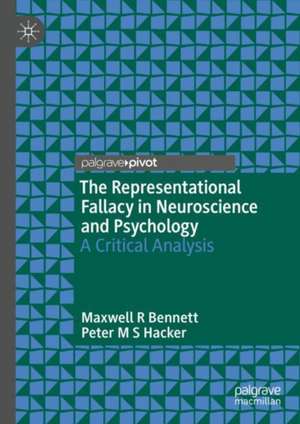The Representational Fallacy in Neuroscience and Psychology: A Critical Analysis
Autor Maxwell R Bennett, Peter Hackeren Limba Engleză Hardback – 9 sep 2024
Preț: 235.55 lei
Nou
Puncte Express: 353
Preț estimativ în valută:
45.07€ • 47.28$ • 37.52£
45.07€ • 47.28$ • 37.52£
Carte tipărită la comandă
Livrare economică 01-15 aprilie
Preluare comenzi: 021 569.72.76
Specificații
ISBN-13: 9783031575587
ISBN-10: 303157558X
Pagini: 82
Ilustrații: X, 812 p. 3 illus.
Dimensiuni: 148 x 210 x 12 mm
Greutate: 0.25 kg
Ediția:2024
Editura: Springer Nature Switzerland
Colecția Palgrave Macmillan
Locul publicării:Cham, Switzerland
ISBN-10: 303157558X
Pagini: 82
Ilustrații: X, 812 p. 3 illus.
Dimensiuni: 148 x 210 x 12 mm
Greutate: 0.25 kg
Ediția:2024
Editura: Springer Nature Switzerland
Colecția Palgrave Macmillan
Locul publicării:Cham, Switzerland
Cuprins
1. The Varieties of Conceptions of Representation.- 2. The Early History of Representations in Experimental Psychology.- 3. The Early History of Neural Representations.
Notă biografică
Maxwell R Bennett is Emeritus Professor of Neuroscience and held the first University Chair for ‘research recognized internationally to be of exceptional distinction’ at the University of Sydney. This research is on the biophysics and neurobiology of synapses. He is the author and co-author of over 300 papers as well as of thirteen books on the neuroscience, history and philosophy of this subject. In the last twenty years he founded The Brain and Mind Research Institute, as well as The Mind & Neuroscience Thompson Institute, each concerned with ameliorating mental illness.
Peter Hacker is Emeritus Fellow of St John's College, Oxford and holds an Honorary Professorship at University College, London at the Institute of Neurology. He is a leading authority on the philosophy of Wittgenstein, has written extensively on philosophy and neuroscience, philosophy of language, philosophy of mind, and the philosophy of human nature. He is author and co-author of more than twenty-five books.
Peter Hacker is Emeritus Fellow of St John's College, Oxford and holds an Honorary Professorship at University College, London at the Institute of Neurology. He is a leading authority on the philosophy of Wittgenstein, has written extensively on philosophy and neuroscience, philosophy of language, philosophy of mind, and the philosophy of human nature. He is author and co-author of more than twenty-five books.
Textul de pe ultima copertă
This book traces the history and coherence of the use of the word ‘representations’ from its origins, particularly in the description of artefacts, to its use in the description of so-called mental and neural representations in the mind and in the brain. It is shown that there are no good reasons for this transition. Experimental psychology is confused in taking what one perceives to be a mental representation. Neuroscientists need to avoid moving readily between the notions of neural and mental representations; indeed even the logic of taking a pattern of neural activity as standing for some sensibly experienced characteristic requires elucidation. It is concluded that the word ‘representation’ when used in experimental psychology and cognitive neuroscience is confounding.
Maxwell R Bennett is Emeritus Professor of Neuroscience and held the first University Chair for ‘research recognized internationally to be of exceptional distinction’ at the University of Sydney. This research is on the biophysics and neurobiology of synapses. He is the author and c0-author of over 300 papers as well as of thirteen books on the neuroscience, history and philosophy of this subject. In the last twenty years he founded The Brain and Mind Research Institute, as well as The Mind & Neuroscience Thompson Institute, each concerned with ameliorating mental illness.
Peter Hacker is Emeritus Fellow of St John's College, Oxford and holds an Honorary Professorship at University College, London at the Institute of Neurology. He is a leading authority on the philosophy of Wittgenstein, has written extensively on philosophy and neuroscience, philosophy of language, philosophy of mind, and the philosophy of human nature. He is author and co-author of more than twenty-five books.
Maxwell R Bennett is Emeritus Professor of Neuroscience and held the first University Chair for ‘research recognized internationally to be of exceptional distinction’ at the University of Sydney. This research is on the biophysics and neurobiology of synapses. He is the author and c0-author of over 300 papers as well as of thirteen books on the neuroscience, history and philosophy of this subject. In the last twenty years he founded The Brain and Mind Research Institute, as well as The Mind & Neuroscience Thompson Institute, each concerned with ameliorating mental illness.
Peter Hacker is Emeritus Fellow of St John's College, Oxford and holds an Honorary Professorship at University College, London at the Institute of Neurology. He is a leading authority on the philosophy of Wittgenstein, has written extensively on philosophy and neuroscience, philosophy of language, philosophy of mind, and the philosophy of human nature. He is author and co-author of more than twenty-five books.
Caracteristici
This book traces the history and coherence of the use of the word ‘representations’ Contends that experimental psychology is confused in taking what one perceives to be a mental representation Examines the logic of taking a pattern of neural activity as standing for some sensibly experienced characteristic
